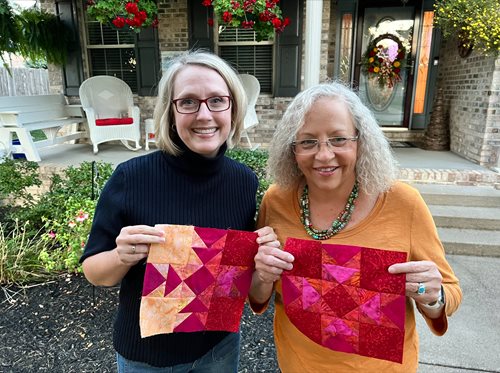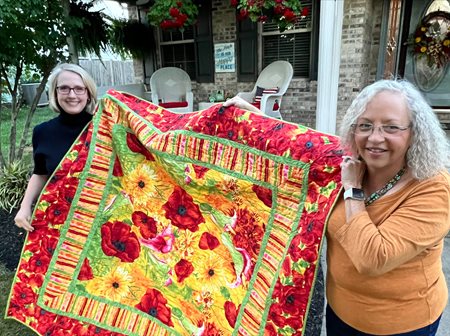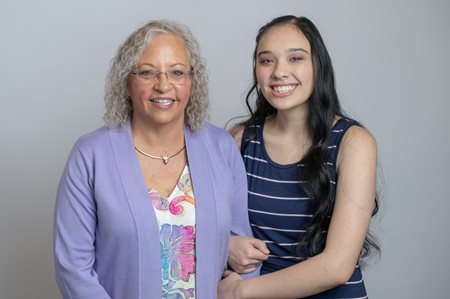
Double Your Impact for the Holidays
Double Your Impact for the Holidays
Your urgently needed year-end gift can go twice as far to provide care and support and accelerate Alzheimer's research this holiday season — and all year long. Show your giving spirit today during this 2x Match Challenge.
Donate Now“If you’re a quilter, you probably have more projects unfinished than finished!” says Emily Smith, stepdaughter of Reda Harrison, who is living with mild cognitive impairment, or MCI. Reda was diagnosed in 2018 at age 58. “Several years ago, Reda purchased a hanging quilt kit with patterns and fabrics that create a beautiful sunrise-to-sunset effect,” Emily says, “and last year, we decided to work on this project together.” When this dynamic mom-daughter duo can carve out a few hours to sew, “We always make the most of it,” says Emily, who notes that this project may take more than 100 hours for her and Reda to complete.
 Reda, an Alzheimer's Association Early-Stage Advisor, knows the power of family — and community — for people living with Alzheimer’s and dementia. “Emily is always so calm, so patient. She is a speech therapist and understands how the brain works,” Reda shares. “She is the perfect partner for quilting, because she is so giving, understanding and supportive in everything that she does. She gives me a lot of guidance and emotional support.” Emily — now an adult with a family of her own — has been in Reda’s life since she was 10 years old, when Reda married Emily's father, Joe.
Reda, an Alzheimer's Association Early-Stage Advisor, knows the power of family — and community — for people living with Alzheimer’s and dementia. “Emily is always so calm, so patient. She is a speech therapist and understands how the brain works,” Reda shares. “She is the perfect partner for quilting, because she is so giving, understanding and supportive in everything that she does. She gives me a lot of guidance and emotional support.” Emily — now an adult with a family of her own — has been in Reda’s life since she was 10 years old, when Reda married Emily's father, Joe.
A Guiding Hand
Emily is not only someone who Reda calls “wonderful” to be around: she also serves as a confidence booster for Reda when they team up in the art of quilting, which requires both focus and patience. “I cut the fabric, and Reda is sewing all of it together,” Emily says. “My role has been to organize this project so that Reda can take it one step at a time. We complete one block of fabric together, and then she finishes the next three on her own, having an example to work off of.”
Emily comes from a long line of quilters, so Reda knew she was up to the task of undertaking this creative project. “When I stopped working after my diagnosis, I had more time to do projects like these, and Emily volunteered to help! This quilt is named after the beautiful sun of Sedona, my favorite place in Arizona,” Reda says. “The quilt will be so pretty and vibrant. I am planning to hang it in my living room once it’s completed.” Emily adds: “After this much work, we are going to put it on display so we can look at it all the time! Our goal is to finish the top portion of the quilt by the end of this year.”
Reda’s Diagnosis Story
Reda first noticed cognitive issues following a vacation in 2018: Returning to her office, she was unorganized and overwhelmed, nothing like her usual self. After a series of cognitive tests, a neurologist diagnosed her with dementia and told her to return in six months for a follow-up appointment. “I didn’t know anything about dementia, and I wasn’t given any information or resources,” Reda says. “When you are diagnosed with a disease like cancer, the doctor gives you a plan, or sends you to someone for guidance. Why are Alzheimer's and dementia treated differently?”
 Diving into proactive mode, Reda began gathering as much information as she could. She connected with the Alzheimer’s Association, and became active with a local early-stage support group. Later, when she participated in an MCI group study at the University of Kentucky Sanders-Brown Center on Aging, “I wondered why I was there, when my diagnosis was dementia,” Reda says. “I later learned that my official diagnosis on record was MCI, despite being told it was dementia, two full years later.”
Diving into proactive mode, Reda began gathering as much information as she could. She connected with the Alzheimer’s Association, and became active with a local early-stage support group. Later, when she participated in an MCI group study at the University of Kentucky Sanders-Brown Center on Aging, “I wondered why I was there, when my diagnosis was dementia,” Reda says. “I later learned that my official diagnosis on record was MCI, despite being told it was dementia, two full years later.”
As it transpired, a six-week work furlough during the COVID-19 pandemic left Reda feeling much better, due to less stress, and after applying for social security disability income and refinancing her home, she retired in 2021. Because of her experiences, Reda encourages others to advocate for themselves in the wake of an Alzheimer’s or dementia diagnosis. “My husband is 13 years older than I am. I thought I would be taking care of him,” she says. “That is not the case. I am so thankful that Emily helps her dad process what I am going through, and is a listening ear for him. You can never have enough support around you, and it is all the better when it is from someone you love.”
Walking Forward with Faith
Today, Reda is focused on living well — including taking daily walks with Dolly Parton, her Standard Poodle, who is currently being trained as Reda’s service dog. “We walk up to four miles a day, and I do all I can to stay mentally and socially engaged,” Reda says. And despite her diagnosis, Reda says, definitively: “I am probably happier than I’ve ever been. I have taken control of my health and my own life as much as possible, and I want to encourage others to do the same.”
Reda also believes that her faith has seen her through the more difficult moments of facing her disease. “That is why I am so comfortable about this stage of my life,” she says. “I have gotten through so much due to my faith, and I will continue to do so.” As a participant in the Walk to End Alzheimer's in Lexington, Kentucky, Reda indeed moves forward, and is never at a loss for new ideas. When she decided that wanted to create personalized shirts for her walk team members, she knew that Emily would be the perfect person to create a design born from Reda’s imagination: her walking with her dog Dolly, being visited by a purple butterfly, a symbol she connects to the experience of living with MCI.
Communicating with Compassion
“Reda has always been so open about her diagnosis, and receptive as we face her disease as a family,” Emily shares. Reda wants her entire family to know what is going on with her, always. “This is my life now; this is who I am,” she says. “I encourage others to be as open with themselves and others that I am trying to be. This is not just my journey, this is the journey of everyone I know and love.”
Emily says that Reda’s bravery and resilience will continue to inspire her own children, as they learn compassion and empathy towards others. “Who knows what paths they may choose in life because of Reda setting this beautiful example of strength and honesty?” Emily hopes other families facing a similar diagnosis will educate themselves about the stages of Alzheimer’s, care strategies, and planning for the future, connecting with professionals and community along the way.
And while Reda knows this disease has changed her, not all of the changes are negative. “I am no longer a shy person who doesn’t speak openly. I am more outgoing, and more upfront. I am not going down without a fight.”
Who do you celebrate this National Daughters Day, and every day? Let us know in the comments.
 About: Born in California, Reda Harrison began working at the University of Kentucky at age 17, working in various departments for nearly 30 years, most recently as a surgery coordinator. Today, she loves spending time with her grandchildren, and she is learning Spanish and taking piano lessons to challenge her cognition.
About: Born in California, Reda Harrison began working at the University of Kentucky at age 17, working in various departments for nearly 30 years, most recently as a surgery coordinator. Today, she loves spending time with her grandchildren, and she is learning Spanish and taking piano lessons to challenge her cognition.
Reda and her husband Joe live in Nicholasville, Kentucky. They have four children living across the world. Emily lives closest with her husband Josh and their children, Finley and Owen. Reda’s travel companion is her granddaughter, Anna, pictured right. Visit Reda (and Dolly’s!) Walk to End Alzheimer’s page and learn more about our National Early-Stage Advisory Group.

The first survivor of Alzheimer's is out there, but we won't get there without you.
Donate Now
Learn how Alzheimer’s disease affects the brain.
Take the Brain Tour
